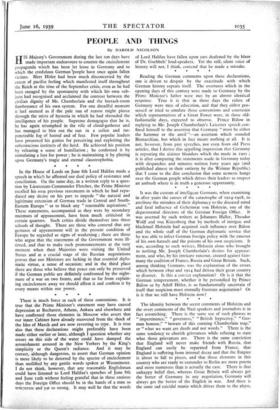In the House of Lords on June 8th Lord Halifax
made a speech in which he affirmed our dual policy of resistance and conciliation. On the same day, in a written reply to a ques- tion by Lieutenant-Commander Fletcher, the Prime Minister recalled his own previous statements in which he had repu- diated any desire on his part to impede " the natural and legitimate extension of German trade in Central and South- Eastern Europe " or to block any " reasonable aspirations." These statements, accompanied as they were by secondary murmurs of appeasement, have been much criticised in certain quarters. Such critics divide themselves into three schools of thought. There are those who contend that any gestures of appeasement will in the present condition of Europe be regarded as signs of weakening ; there are those who argue that the statements of the Government were ill- timed, and that to make such pronouncements at the very moment when their Majesties were visiting the United States and at a crucial stage of the Russian negotiations proves that our Ministers are lacking in that essential diplo- matic virtue, a sense of occasion; and in the third place there are those who believe that peace can only be preserved if the German public are definitely confronted by the night- mare of a war on two fronts, and that so far from explain- ing encirclement away we should affirm it and confirm it by every means within our power.






















































 Previous page
Previous page